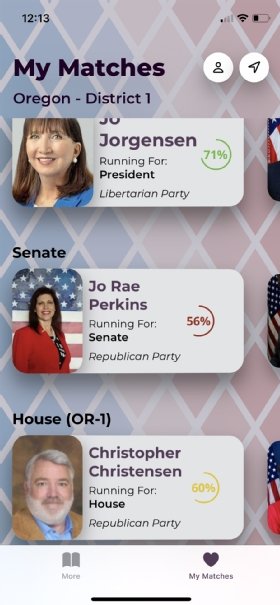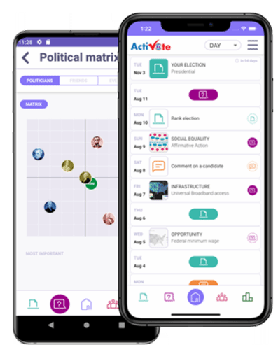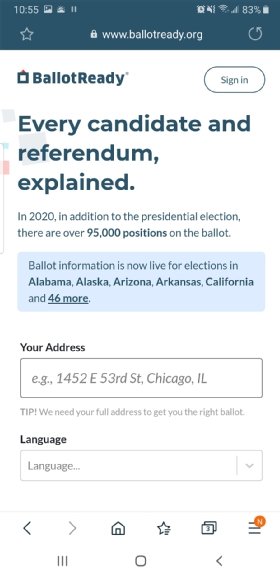
igor - Fotolia
Election apps, advertising target mobile phone users
As political campaigns ramp up their use of mobile technology to do battle this election season, apps have arisen to inform citizens and encourage them to vote.
Through informational election apps and campaign advertisements, political organizations reach out to voters where they are: on their mobile phones.
Amid a cluttered media landscape, mobile devices present organizations, companies and campaigns with another option to get their message out. Apps offer 2020 voters information about candidates' positions, ballot referenda and polling places. Mobile campaign advertisements target and mobilize a candidate's base.
As mobile phones become a prevalent force in our lives, they are poised to gain greater importance during campaign seasons.
Election apps as information sources
In recent years, many mobile-accessible online information sources have arisen. Apps like VotingSmarter match voters to candidates based on their positions on issues, similar to a dating app introducing people with similar interests. Others have a different purpose. ActiVote and BallotReady provide accurate, nonpartisan information to help voters cast their ballots and hopefully prove a bulwark against disinformation.

Terry Crandall, CEO of VotingSmarter, said many people use shortcuts when voting. Voters often opt for a candidate because of political affiliation, age, race or charisma, rather than their stances on the issues or effectiveness as a leader, he said.
Crandall said millennials and Gen Z are hesitant to vote not because of apathy or self-absorption, but because they do not feel informed enough to cast a ballot. Thus, it makes sense to make that information available in a medium that's familiar to them.
VotingSmarter presents a series of statements to its users, prompting them to agree or disagree. It then offers them the candidates with whom they most agree.

Sara Gifford, COO and co-founder of ActiVote, said mobile apps can also acclimate people to democracy. In addition to providing information, ActiVote's app prompts users to do one small task each day, like encouraging friends and family to vote or answer policy questions. She said ActiVote strives to make political involvement a habit, rather than just thinking about issues only every two or four years.
While most people already know their favored candidate in the presidential race, the down-ballot contests can be a mystery to them, said Alex Niemczewski, CEO of BallotReady.
"What they end up doing is guessing, leaving blanks or not showing up to vote altogether," she said.
This is a problem because while voters may be unfamiliar with the races, the candidates who win them hold powerful local seats and make crucial decisions.
BallotReady provides information that people can bring into the voting booth. In the states that allow it, voters can look at the mobile site on their phones while voting. In other states, citizens can print out the ballot information and review it while selecting their candidates.
Advertising via mobile devices
Mobile phones are also a medium for campaign advertisements, through text messages and ads on social networks and applications. People are on their phones throughout the day, offering a means of consistent contact with voters, said Tobe Berkovitz, an advertising professor at Boston University. That differs from TV, which people watch only during certain times of the day.
Mobile advertising also allows campaigns to better target their messages, Berkovitz said. When online, people seek out what they want and avoid what they don't. Therefore, it is easier to find those who might be receptive to a candidate's pitch and tailor a message based on their interests and demographics.
"I can be looking for a Saturday Night Live clip on YouTube, and up pops a political spot," he said. "I could be looking for political information, and up pops a political spot. I could be looking for cat food, and up pops a political message."
Despite the advantages mobile ads bring, broadcast advertising is unlikely to go away anytime soon.
"[For] every cycle where we say, 'That's probably it for TV and cable,' then we get a cycle like this, where presidential campaigns are spending close to a billion dollars on broadcast alone," Berkovitz said.
TV is better at reaching people who may not have an interest in politics but feel a civic duty to vote, Berkovitz said. Mobile advertisements and campaign websites are good at drawing those already interested in the political process.
The future
As the 2020 election season comes to a close, the question of how mobile technology and election apps might affect future elections remains an open one. The possibility that people may one day cast their ballots with their mobile phones is hotly contested. While pilot programs are testing mobile voting apps, security concerns mean widespread adoption is likely years away.

Gifford said mobile voting would be a dramatic step in encouraging voter participation but noted that the need to ensure ballot security is paramount.
"Will we get online voting? I think you would be a fool to say we'll never get it," she said. "I do think, if you fast-forward 20 years, we will be voting online."
Crandall agreed, noting that the marketplace had previously found ways to conduct business securely through mobile technology. He cited Venmo, which allowed people to easily send money to each other in a relatively safe manner. However, Venmo has not been immune to security concerns.
The 2020 election might play a key role in how future contests develop, Crandall said. If mail-in voting goes smoothly, election officials might stick with the present system. If it doesn't, that might whet the public's appetite for change.
"If there's a whole bunch of court cases over mail-in ballots, or a whole swath of the country doesn't believe in the outcome, or it takes months to figure it out, then I think technology will jump to the head of the line for the next presidential election," he said.








